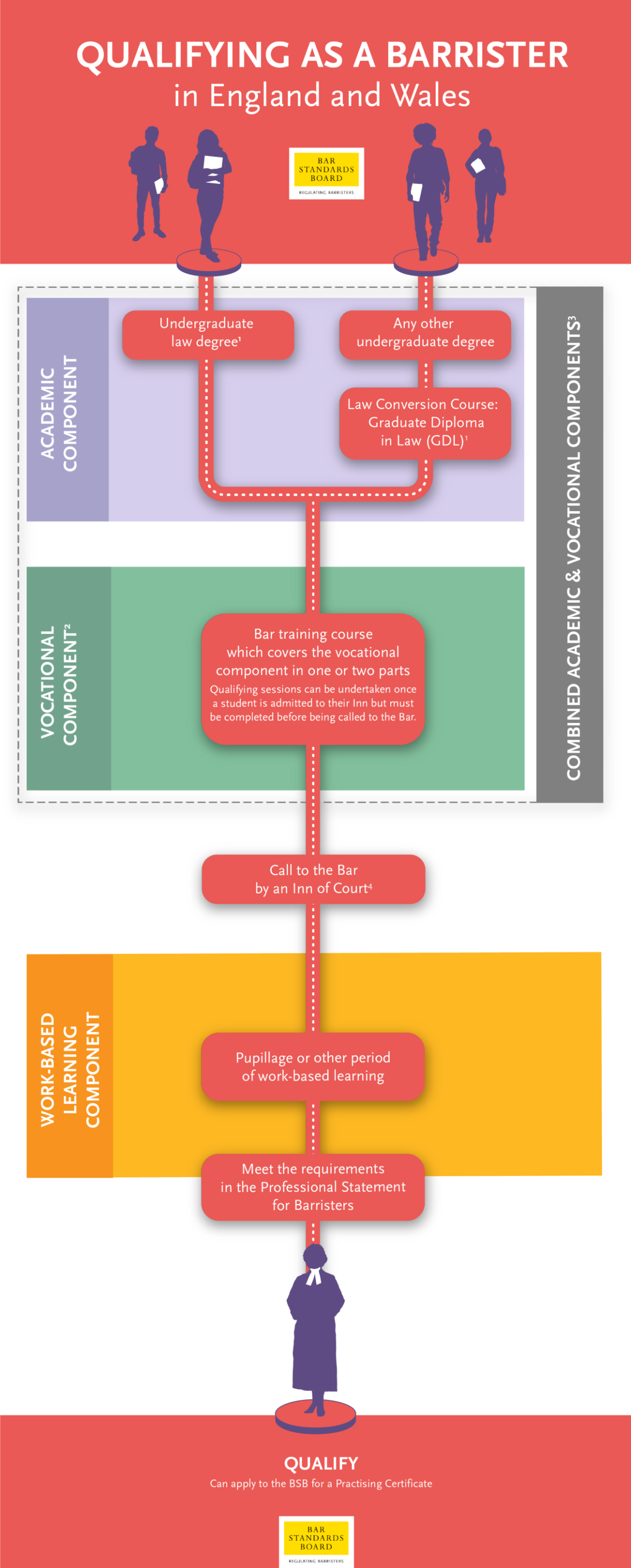This page gives an overview of the process for becoming a barrister for students, pupils and transferring qualified lawyers.
The education and training of barristers is very important because barristers play a vital role in the administration of justice. As such, they must demonstrate a high standard of professional behaviour to justify the trust placed in them by the public and other professionals.
A career as a barrister can be very varied and rewarding. However, becoming a barrister is highly competitive. There are many more people who want to become barristers than places available.
There are three components to training to become a barrister. These are:
- the academic component;
- the vocational component, and
- the pupillage or work-based learning component.
Barristers come from a wide variety of educational backgrounds, and many come to practise at the Bar later in life, after having studied or worked in a different field. While the majority of barristers do pursue a career at the Bar after studying law, many have also previously studied other subjects before subsequently undertaking a law conversion course. Common non-law degrees studied include history, politics, economics, and foreign languages.
1. Your Law Degree or GDL must include the seven foundations of legal knowledge and the skills associated with graduate legal work such as legal research.
2. You must join an Inn before you start vocational training but you can join earlier if you wish.
3. Some AETOs offer courses which allow you to combine the academic and vocational components of Bar training. Some incorporate an undergraduate law degree and some are designed as postgraduate courses which you can study if you have a non-law degree.
4. You may start the first six-month period of pupillage before being Called to the Bar but you will not be able to start your second six-month period unless you have been Called, because your second six involves you practising as a barrister under the supervision of your Pupil Supervisor.
Lawyers who have qualified in another jurisdiction, for example solicitors based in England and Wales or lawyers from overseas, may be exempt from some or all of these components, depending on their qualifications and experience.

The academic study of the law in England and Wales is a very important part of the knowledge expected of all barristers. To complete the academic component of training, you need either a law degree or a non-law degree and the Graduate Diploma in Law (GDL). Your degree needs to be a minimum of a 2:2. During the academic component, you will cover the seven foundations of legal knowledge.
For more information about the academic component, visit this webpage. The rules and requirements relating to the academic component of training can be found in Part 2 of the Bar Qualification Manual.
The vocational component covers a range of subjects to ensure that you acquire the specialist skills, knowledge of procedure and evidence, attitudes and competence to prepare you for becoming a barrister. It is satisfied by completing a Bar training course. In order to enrol on a Bar training course, you must be fluent in English, and be a member of one of the Inns of Court.
During the vocational component, students must also attend qualifying sessions with their Inn of Court. These are professional development events of an educational and collegiate nature which are arranged by or on behalf of an Inn.
If you successfully complete the vocational component of training, you are Called to the Bar by your Inn. However, you may not practise as a barrister until you have completed the pupillage/work-based learning component.
For more information about the vocational component, visit this webpage. The rules and requirements relating to the vocational component of training can be found in Part 3 of the Bar Qualification Manual.
In order to be authorised to practise as a barrister, you must first undergo a period of work-based, practical training under the supervision of an experienced barrister. This is known as pupillage, and those who are currently undergoing pupillage are called pupils. Obtaining a pupillage is very competitive.
Pupillage is divided into two parts: a non-practising period, usually of six months, and a practising period, usually of six months. Our rules stipulate that, as a pupil, you must receive a minimum award whilst you train during your pupillage, although some pupils earn more than the minimum amount.
For more information about the pupillage/work-based learning component, visit this webpage. The rules and requirements relating to the pupillage component of training can be found in Part 4 of the Bar Qualification Manual.
Certain individuals, such as qualified solicitors, qualified lawyers from other jurisdictions, and legal academics may wish to become barristers. Depending on their qualifications and experience, they may be exempt from some or all of the above requirements. Some of these exemptions may be granted subject to passing the Bar Transfer Test (BTT).
For more information about transferring to the Bar as a qualified lawyer, visit this webpage. The rules and requirements relating to transferring qualified lawyers can be found in Part 7 of the Bar Qualification Manual.


